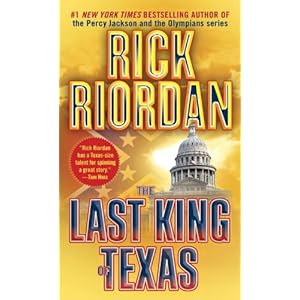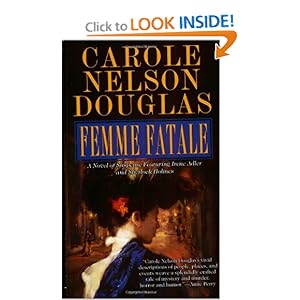 Although I think I've read everything Rick has written, to date I've only reviewed one other Tres Navarre novel, The Devil Went Down to Austin. Not for lack of love, but because when I was reading the other books, I wasn't writing reviews. I come back to The Last King of Texas pursuant to a character I'm developing for my next novel, a dealer in arcade and casino games for the greater southwest region. As it turns out, there's not a lot in common between my character, Buckworth, and Riordan's Del Brandon, carnival ride dealer down in San Antonio.
Although I think I've read everything Rick has written, to date I've only reviewed one other Tres Navarre novel, The Devil Went Down to Austin. Not for lack of love, but because when I was reading the other books, I wasn't writing reviews. I come back to The Last King of Texas pursuant to a character I'm developing for my next novel, a dealer in arcade and casino games for the greater southwest region. As it turns out, there's not a lot in common between my character, Buckworth, and Riordan's Del Brandon, carnival ride dealer down in San Antonio.But any minute reading a Tres Navarre novel is not wasted, regardless the motivation or outcome. This is actually the first Riordan novel I ever read, having discovered it while living in Honolulu. I mean, how can you pass up a novel with this title? I immediately went back and got the first two and moved on from there.
I've had the chance to meet Riordan on three or four occasions, the first being when I took a half-day workshop he taught on writing a mystery novel, just before the first Percy Jackson book came out. Extremely nice guy.
I dare anyone to read the first chapter of this book and set it down and walk away. I can't imagine the person who could do such a thing. Well, there's my son-in-law, but nobody else. I would give you some quotable lines, but there are dozens in every chapter, so I lost track.
Look, forget all that. Just go out and get the dang book and read it. Okay?
Oh, and Rick, I know you're busy writing best-seller YA novels left and right, but hire someone to be-Kindle your Tres Navarre backlist. Just do it.
 Bless me father, for I've been reading Dickens. It's been three years since my last novel.
Bless me father, for I've been reading Dickens. It's been three years since my last novel. In the final (as far as I know) novel of the series, Irene stays in New York on a mission to unearth the truth about her origins, particularly her mother.
In the final (as far as I know) novel of the series, Irene stays in New York on a mission to unearth the truth about her origins, particularly her mother. In the (to my knowledge) penultimate Irene Adler story, The Woman returns to her roots, America, drawn by a meddling Nellie Bly. People from her mostly forgotten childhood are dying by the cartloads and three people are on the case, working independently, Adler, Bly, and Holmes.
In the (to my knowledge) penultimate Irene Adler story, The Woman returns to her roots, America, drawn by a meddling Nellie Bly. People from her mostly forgotten childhood are dying by the cartloads and three people are on the case, working independently, Adler, Bly, and Holmes.